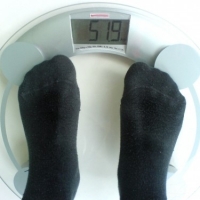Lose Weight > Weight Loss Tips > Weight Loss Articles > Is Gastric Bypass Weight Loss Surgery Right For You?
Is Gastric Bypass Weight Loss Surgery Right For You?
Weight loss surgery can be divided into three types:
1. Restrictive procedures to reduce the size of your stomach,
2. Mal-absorptive procedures alter the flow from your stomach to your intestine, and
3. Combination procedures that involve the characteristics of both of the above procedures.
This article will be focusing on the first option.
Gastric bypass surgery is one type of weight loss surgical procedures that can be used, and is actually commonly used, to cause significant weight loss for a patient that is exceedingly obese. Gastric bypass surgery is designed to reduce the body's intake of calories. Calorie reduction through this surgery is accomplished in two main ways:
1. After the surgery, the patient's stomach is actually smaller than it was. This means that the patient will feel full faster and it will be easier for the candidate to learn to reduce the amount of food that he/she consumes.
2. Part of the patient's stomach and small intestines are literally bypassed in the food consumption process so that fewer calories are absorbed by the candidate.
Prior to any successful weight loss operation, the patient's doctor will give the patient a complete medical examination to evaluate the patient's state of overall health. A psychological evaluation will also be undertaken. If at the conclusion of the consultation and evaluation, the doctor does not feel the patient is ready, then the surgery will not be recommended. Should the doctor recommend the procedure, then the patient will receive extensive nutritional counseling before (and after) the surgery.
Gastric bypass surgery is always performed under anesthesia. There are two basic steps to the surgery:
1. The first step in the surgery makes the patient's stomach smaller. The surgeon divides the stomach into a small upper section and a larger bottom section using staples that are like stitches. The top section of the stomach will hold any digested food.
2. After the stomach has been divided, the surgeon connects a section of the small intestine to the pouch. This ensures that the food bypassed the lower portion of the stomach.
Gastric bypass surgery can be performed using a laparoscope. This technique is actually far less invasive than traditional surgery. The incisions are much smaller and therefore are a little less painful and a lot less noticeable, which lowers the risk of large scars and hernias after the procedure. Once the small incisions are made in the abdomen, then the surgeon passes slender surgical instruments through these narrow openings, as well as, a camera so that he or she can see the maneuvering of the instruments.
If you have gastric bypass surgery, then you will usually need to stay in the hospital for 4 to 5 days after the doctor performs the surgery on you. Your doctor will approve your discharge to go back home once you are able to do the following:
1. Move without too much discomfort,
2. Eat liquid and/or pureed food without vomiting it back up, and
3. No longer requiring pain medication to be administered by injection.
You will remain on liquid or pureed food for several weeks after the surgery. Even after that time, you will feel full very quickly. This is because the new stomach pouch initially only holds a tablespoonful of food. The pouch eventually expands but will generally allow you no more than one cup of food.
1. Restrictive procedures to reduce the size of your stomach,
2. Mal-absorptive procedures alter the flow from your stomach to your intestine, and
3. Combination procedures that involve the characteristics of both of the above procedures.
This article will be focusing on the first option.
Gastric bypass surgery is one type of weight loss surgical procedures that can be used, and is actually commonly used, to cause significant weight loss for a patient that is exceedingly obese. Gastric bypass surgery is designed to reduce the body's intake of calories. Calorie reduction through this surgery is accomplished in two main ways:
1. After the surgery, the patient's stomach is actually smaller than it was. This means that the patient will feel full faster and it will be easier for the candidate to learn to reduce the amount of food that he/she consumes.
2. Part of the patient's stomach and small intestines are literally bypassed in the food consumption process so that fewer calories are absorbed by the candidate.
Prior to any successful weight loss operation, the patient's doctor will give the patient a complete medical examination to evaluate the patient's state of overall health. A psychological evaluation will also be undertaken. If at the conclusion of the consultation and evaluation, the doctor does not feel the patient is ready, then the surgery will not be recommended. Should the doctor recommend the procedure, then the patient will receive extensive nutritional counseling before (and after) the surgery.
Gastric bypass surgery is always performed under anesthesia. There are two basic steps to the surgery:
1. The first step in the surgery makes the patient's stomach smaller. The surgeon divides the stomach into a small upper section and a larger bottom section using staples that are like stitches. The top section of the stomach will hold any digested food.
2. After the stomach has been divided, the surgeon connects a section of the small intestine to the pouch. This ensures that the food bypassed the lower portion of the stomach.
Gastric bypass surgery can be performed using a laparoscope. This technique is actually far less invasive than traditional surgery. The incisions are much smaller and therefore are a little less painful and a lot less noticeable, which lowers the risk of large scars and hernias after the procedure. Once the small incisions are made in the abdomen, then the surgeon passes slender surgical instruments through these narrow openings, as well as, a camera so that he or she can see the maneuvering of the instruments.
If you have gastric bypass surgery, then you will usually need to stay in the hospital for 4 to 5 days after the doctor performs the surgery on you. Your doctor will approve your discharge to go back home once you are able to do the following:
1. Move without too much discomfort,
2. Eat liquid and/or pureed food without vomiting it back up, and
3. No longer requiring pain medication to be administered by injection.
You will remain on liquid or pureed food for several weeks after the surgery. Even after that time, you will feel full very quickly. This is because the new stomach pouch initially only holds a tablespoonful of food. The pouch eventually expands but will generally allow you no more than one cup of food.
Related Articles
-
Surprisingly The Best Exercise To Lose Weight
Do you think that going to the gym or running i
-
Green Tea Diet Plans, Buy Green Tea Online
Ahmad herbal tea – ROOIBOS & CINNAMON Green Tea Diet Plan
-
The Fat You Need to Stay Fit and Trim
Getting healthy is something we should all strive for. More and more p
-
Fat Burning Furnace - Lose Weight Really Fast Using Advanced Workouts!
Fat Burning Furnace - Lose Weight Really Fast Using Advanced Workouts!
-
78 Calorie a Day Weight Loss Diet Supplement
Grab Your Free Copy of Rapid Results Weight Loss Plan here:
-
How Many Calories Can You Burn Spring Cleaning in 2015?
Well, spring cleaning might not be the best way to celebrate, but it
- DON'T MISS
- Weight Loss In A Natural Way
- Fat Loss 4 Idiots - I tried Fat Loss 4 Idiots!
- Burn The Fat Feed The Muscle Amazon - Burn the Fat Feed the Muscle Review
- Myths and misconceptions protein shake
- What is Oral HCG?
- Help Me Lose Weight
- 5 Key Ways To Burn Fat Faster Than Ever Before
- Best Diet Foods and Weight Loss Plans
- Try Breathslim and breathe your way to a slimmer figure
- Fat Burning Furnace - 1 Simple Program with Fast Fat Loss Tips!




